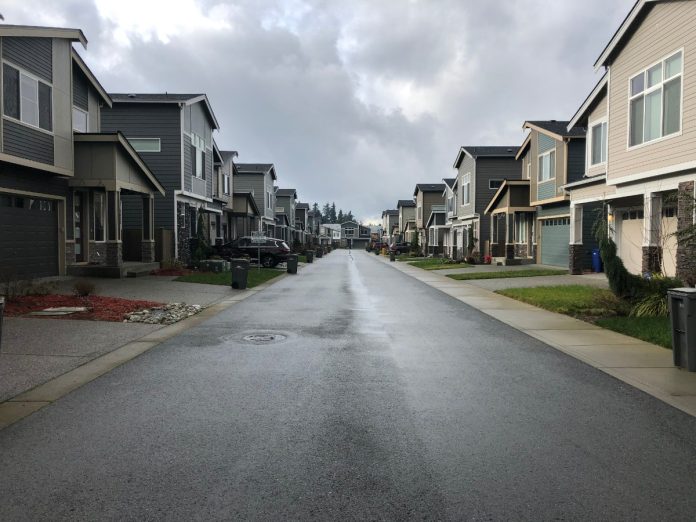
Donald Trump is losing the suburbs, but he has a plan and wants “Suburban Housewives” to know it. The plan will be familiar to urbanists: stoking fears of single-family zoning reform and low-income housing and brazenly claiming opponents want to “abolish the suburbs.” Eerie isn’t it–am I reading a Seattle Times column?
Packaging sexism, classism, and screaming racist dogwhistles together is hardly a new formula for the president, but squarely targeting suburban voters with all the subtlety of an atomic bomb is novel.
Urbanists have long argued that widespread single-family zoning is a racist artifact that drives up housing costs and furthers segregation. Reform that zoning and it allow more affordable housing, more seniors to age in place, higher transit frequencies, and lower climate emissions. Much to our chagrin, suburban cities and neighborhoods continue to be overwhelmingly dominated by single-family zoning in the Seattle region and across much of the county. Still, that message is slowly making inroads.
In a tele-town hall earlier this month, Trump said that Democrats want to “eliminate single-family zoning, bringing who knows into your suburbs, so your communities will be unsafe and your housing values will go down.” Even more melodramatically, he claimed former Vice President Joe Biden wants to “abolish the suburbs.”
Biden painted those accusations as smears. Biden’s housing plan does identify exclusionary zoning as a problem and sets aside $65 billion in low-income housing funding for jurisdictions “willing to implement zoning laws that encourage more affordable housing.” However, this incremental incentives-driven approach hardly qualifies as the wholesale top-down elimination Trump portrayed.
Trump must have been keeled over on a Victorian feinting couch when he painted his nightmarish vision of the consequences of loosening single-family zoning laws, which bear little resemblance to empirical housing research. Building low-income housing does not cause housing prices to collapse.
$65 billion in new incentives for state housing authorities and the Indian Housing Block Grant program to construct or rehabilitate low-cost, efficient, resilient, and accessible housing in areas where affordable housing is in short supply. These funds will be directed toward communities that are suffering from an affordability crisis and that are willing to implement new zoning laws that encourage more affordable housing.
Joe Biden’s Housing Plan
He followed up his townhall comments with tweets boasting of killing Obama’s Affirmatively Further Fair Housing (AFFH) rule and blocking low-income housing.
“I am happy to inform all of the people living their Suburban Lifestyle Dream that you will no longer be bothered or financially hurt by having low income housing built in your neighborhood,” Trump said on Wednesday. “Your housing prices will go up based on the market, and crime will go down. I have rescinded the Obama-Biden AFFH Rule. Enjoy!”
Enacted in 2015, AFFH aims to reduce racial segregation in the suburbs, and Trump has had it in his sights for some time. Republican leaders have long sought to shrink low-income housing investments, and Trump highlighted the greed underlying that goal.
In so brashly making the case for keeping suburbs segregated, Trump has helped unmask the racism underlying opposition to local low-income housing and single-family zoning preservation. In other words, he may have aided the housing justice movement. Some observers also argued Trump’s suburban vision is antiquated; suburbs are no longer as racially segregated as in yesteryear. In fact, many suburbs are more diverse than their proximate center cities.
Likely, Trump’s desperate appeal to suburbanites will fail–polls sugguest he has tons of ground to make up. Still, anyone who has fought for zoning reform and more housing in their neighborhood knows that it’s a charged topic and converting opponents is very challenging. The gamble might just help him.
I doubt Trump will gain new votes from Wallingford Craftsmen households that sported anti-upzone lawn signs and fought Mandatory Housing Affordability rezones. But will these folks stop and examine why they find themselves on the same side as the president?
Doug Trumm is publisher of The Urbanist. An Urbanist writer since 2015, he dreams of pedestrian streets, bus lanes, and a mass-timber building spree to end our housing crisis. He graduated from the Evans School of Public Policy and Governance at the University of Washington in 2019. He lives in Seattle's Fremont neighborhood and loves to explore the city by foot and by bike.

